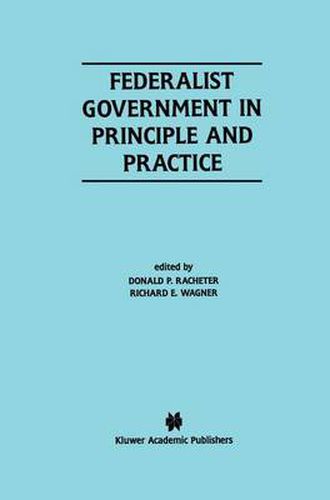Readings Newsletter
Become a Readings Member to make your shopping experience even easier.
Sign in or sign up for free!
You’re not far away from qualifying for FREE standard shipping within Australia
You’ve qualified for FREE standard shipping within Australia
The cart is loading…






This title is printed to order. This book may have been self-published. If so, we cannot guarantee the quality of the content. In the main most books will have gone through the editing process however some may not. We therefore suggest that you be aware of this before ordering this book. If in doubt check either the author or publisher’s details as we are unable to accept any returns unless they are faulty. Please contact us if you have any questions.
Federalism has generally been characterized as a system of government that is friendly to liberty. It is not obvious, though, why this should be so. Federalism is a form of government where citizens simultaneously reside in at least two governments, each of which has independent authority to tax and to regulate. By contrast, in a unitary form of government citizens face only one government with independent authority to tax and regulate. At first glance, it would seem a bit strange to claim that liberty is more secure when citizens are members of two governments with independent authority than when they are members of only one such government. The relationship between federalism and liberty turns out to be a complex one, and one that is capable of working in either direction. Whether federalism supports or erodes liberty depends on importantly on the institutional framework within which federalist governance takes place. The essays in Federalist Government in Principle and Practice examine this institutionalist theme from both theoretical and practical perspectives.
$9.00 standard shipping within Australia
FREE standard shipping within Australia for orders over $100.00
Express & International shipping calculated at checkout
This title is printed to order. This book may have been self-published. If so, we cannot guarantee the quality of the content. In the main most books will have gone through the editing process however some may not. We therefore suggest that you be aware of this before ordering this book. If in doubt check either the author or publisher’s details as we are unable to accept any returns unless they are faulty. Please contact us if you have any questions.
Federalism has generally been characterized as a system of government that is friendly to liberty. It is not obvious, though, why this should be so. Federalism is a form of government where citizens simultaneously reside in at least two governments, each of which has independent authority to tax and to regulate. By contrast, in a unitary form of government citizens face only one government with independent authority to tax and regulate. At first glance, it would seem a bit strange to claim that liberty is more secure when citizens are members of two governments with independent authority than when they are members of only one such government. The relationship between federalism and liberty turns out to be a complex one, and one that is capable of working in either direction. Whether federalism supports or erodes liberty depends on importantly on the institutional framework within which federalist governance takes place. The essays in Federalist Government in Principle and Practice examine this institutionalist theme from both theoretical and practical perspectives.